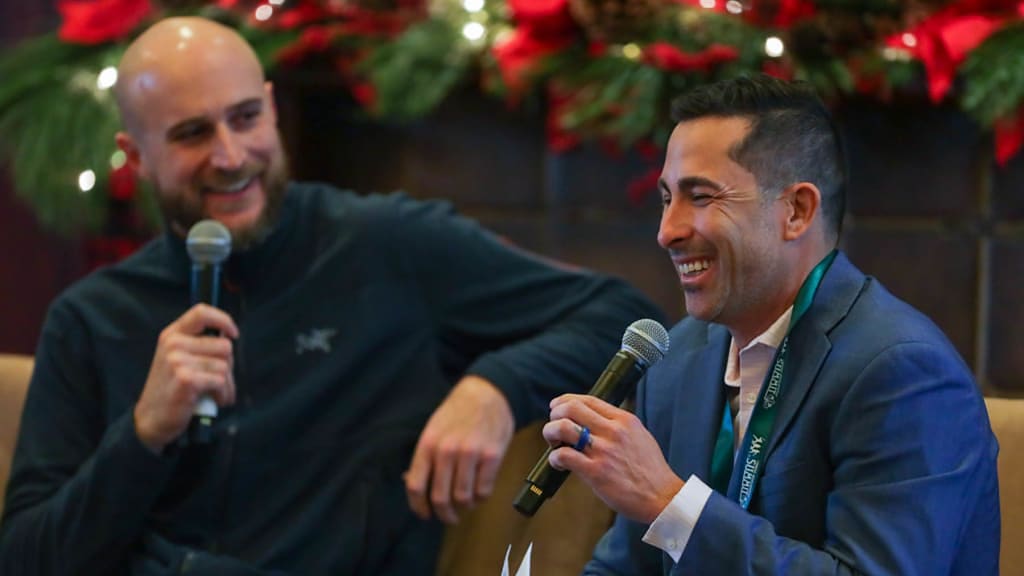
Ryan Spilborghs was moving about at a hectic pace and one wondered if he got his sports confused.
"OK, two minutes,'' said Spilborghs, a former major leaguer and current Rockies and MLB radio broadcaster. "Two minutes!"
The drill was the goal of absorbing more information during the next panel at the Major League Baseball Players Alumni Association's Career Development Summit in La Jolla, Calif. The second annual event was held on the eve of the MLB Winter Meetings, with these participants looking to make deals, too.
More than 50 ex-big leaguers were getting a big-time education of making the turn and it had nothing to do with getting two outs up the middle.
These men were segueing from playing to being employed and the MLBPAA was there to assist in that endeavor.
"We identified a severe issue and that is guys transitioning out of the game,'' said Dan Foster, the CEO of the MLBPAA. "Some handle it well and some not so well.''
That's why guys that chased fastballs and fly balls were running head first into their post-baseball life. This conference was about preparing these prospective employees to make an impression with getting face time with future employers.
"A lot of them are like a ship without a rudder,'' Foster said. "We're not handing them a job. Instead we are preparing them to go get a job.''
Those sharing hiring secrets made something abundantly clear: there are no shortcuts and no better trait than being persistent.
That includes networking at all times.
"Some love it and some detest it,'' said Amy Kosh of the Ayers Group, the MLBPAA's exclusive career development and transition service partner. "Most people would rather do anything but network. But it doesn't have to be a big deal. Just think of it as having a conversation.''
Right-hander Brad Boxberger has heard the chatter of what lies beyond painting corners. While he's a free agent hoping to pitch next season, he knows there's more to living than owning the inside of the plate.
"We all hope that we make enough money in our career that we don't have to work, or do something we don't want to do, for the rest of our life,'' said Boxberger, who's pitched for four teams in eight years. "But the reality is that's not always the case.''
So Boxberger was listening to speakers talking about being your own boss, getting a job in coaching, the business side of baseball in the front office, broadcasting, becoming a sports agent and even how to be hired as a manager, which featured the Dodgers' Dave Roberts, the Rockies' Bud Black and Hall of Famer Tony La Russa.
That's a lot to consume, but then again, there are many years to fill after the cheering stops.
"All the current players will someday be former players,'' Foster stressed. "And everyone is a former player a lot longer than they are a current player.''
There was a discussion on analytics that drew a packed room. But possibly the most jarring figure on the two-day conference was the one that computed to a 80-20 ratio.
"Eighty percent of people get their next job through networking,'' Kosh said. "Twenty percent of them get it through what I call "click and pray" by applying on line.''
Dave Stewart, the former ace pitcher and general manager now working as a sports agent, has a distinct feeling of what it means when an athletic career which its end.
"For me you're leaving something you have been doing your whole life, it's all you have ever done, and now you are getting out of the dream and stepping into the real world and that can be scary,'' said Stewart, the owner of Sports Management Partners. "It can be depressing and its an adjustment.''
The most challenging component of Stewart's role is telling a client the truth. "The tough part isn't dealing with general managers, owners or teams; it's the life part of the game that becomes a reality for the player,'' he said.
Agent John Boggs has represented everyone from Tony Gwynn to Ichiro Suzuki. As he was speaking, the ink was drying on an $18 million, one-year pact he had negotiated for lefty Cole Hamels with the Braves.
But it's the deals that he can't make that stand out, signaling that a baseball career had expired.
"That's the part that is really very difficult because you're supposed to be close to your players and feel what they are feeling,'' Boggs said. "So you can feel the stress of that player, and his family, and it's tougher if the players hasn't had the financial compensation of others.
"I was the one that had to tell Ichiro, and not the club, that it was over. It was one of the toughest things I had to go through in my life, especially with someone of that stature to say, 'Hey, it's over for you.'''
It was a cautionary tale which had those possibly beginning a new chapter taking notice. "I didn't know what to expect with this,'' Boxberger said of the MLBPAA Career Development Summit. "I definitely gained some insight into how I can find a path, or an avenue, after my career ends.''